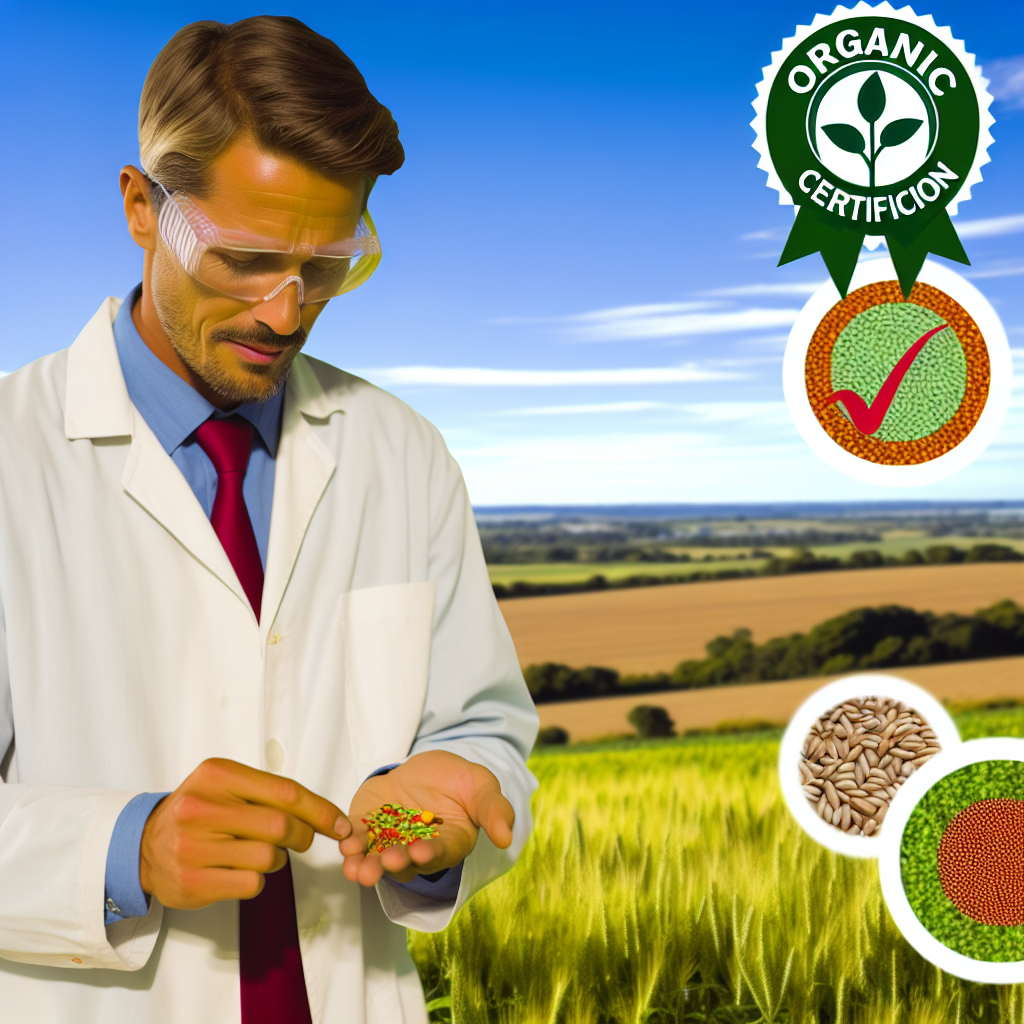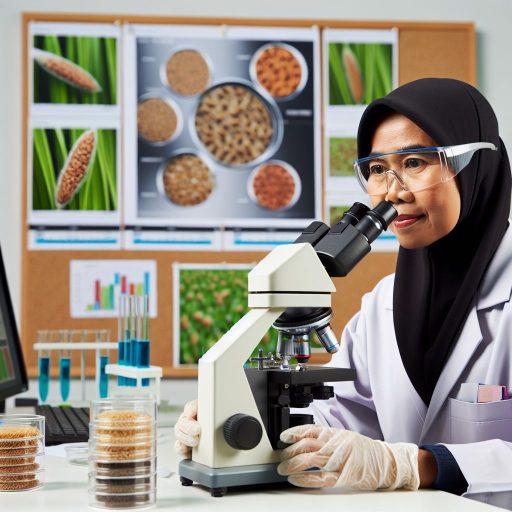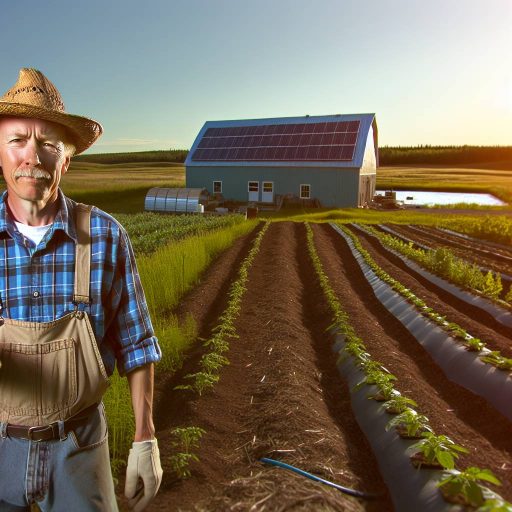Introduction to Seed Technology in Organic Farming
Defining Seed Technology
Seed technology encompasses the development and management of seeds used in agriculture.
It focuses on enhancing seed quality, germination rates, and overall plant health.
This technology plays a critical role in organic farming systems.
Importance of Organic Farming
Organic farming emphasizes sustainability and biodiversity.
It utilizes natural inputs and practices to maintain ecosystem balance.
Moreover, it aims to produce healthy food without synthetic chemicals.
How Seed Technologists Contribute
Seed technologists support organic farmers through research and innovation.
They develop organic seed varieties that are resilient and productive.
Additionally, they provide guidance on selecting suitable seeds for various climates.
Enhancing Seed Quality
Seed technologists assess seed quality using rigorous testing methods.
These methods measure purity, viability, and disease resistance.
Improving seed quality directly benefits crop yields in organic systems.
Promoting Biodiversity
Technology can help increase genetic diversity in crops.
Diverse crops can better adapt to changing environmental conditions.
Furthermore, biodiversity strengthens the resilience of farming systems.
Facilitating Sustainable Practices
Technologists provide resources to educate farmers on sustainable practices.
They promote techniques like crop rotation and intercropping.
These practices enhance soil health and reduce pest pressures.
Adapting to Environmental Challenges
Seed technology is essential for developing crops resistant to climate variability.
Technologists focus on breeding seeds that withstand drought and disease.
These advancements ensure food security amidst environmental changes.
Role of Seed Technologists in Enhancing Crop Diversity
Understanding Crop Diversity
Crop diversity refers to the variety of plant species cultivated for food production.
This diversity is essential for sustainable agricultural systems.
It supports ecosystem resilience and adaptability to climate change.
Seed technologists play a crucial role in this context.
Unlock Your Career Potential
Visualize a clear path to success with our tailored Career Consulting service. Personalized insights in just 1-3 days.
Get StartedImportance of Seed Selection
Choosing the right seeds is vital for crop success.
Seed technologists assess various seed traits such as germination rates.
They evaluate disease resistance and growth adaptability as well.
Proper seed selection enhances crop resilience and productivity.
Breeding for Diversity
Seed technologists are actively involved in plant breeding programs.
They focus on developing varieties that thrive in organic farming systems.
These programs aim to introduce new traits for improved performance.
Diverse crops help in pest management and soil health improvement.
Collaboration with Farmers
Effective collaboration is key to enhancing crop diversity.
Seed technologists work closely with organic farmers to understand their needs.
They provide expertise on seed choices tailored to specific environments.
This partnership fosters an exchange of knowledge and practices.
Education and Training Initiatives
Education plays a pivotal role in promoting agricultural diversity.
Seed technologists conduct workshops to train farmers on best practices.
These initiatives focus on sustainable farming methods and biodiversity.
Empowered farmers can make informed choices about seed usage.
Research and Development
Ongoing research is essential for advancing seed technology.
Seed technologists engage in studies to identify beneficial traits.
This research also examines how diverse crops can withstand climate stresses.
Findings from these studies inform seed production strategies.
Advocacy for Sustainable Practices
Seed technologists advocate for sustainable agriculture practices.
They promote the use of heirloom and open-pollinated seeds.
This approach supports local ecosystems and preserves genetic resources.
By advocating sustainability, they help maintain agricultural biodiversity.
Development of Organic Seed Varieties: Challenges and Solutions
Understanding Organic Seed Varieties
Organic seed varieties are vital for sustainable farming practices.
They enhance biodiversity and improve soil health.
Moreover, these varieties adapt better to organic conditions.
Challenges in Development
Developing organic seed varieties poses several challenges.
The first challenge is limited genetic diversity.
Many conventional varieties lack organic-specific traits.
Additionally, farmers often face regulatory hurdles.
These regulations can delay the approval of new varieties.
Collaboration among Seed Technologists
Collaboration plays a crucial role in overcoming challenges.
Seed technologists must work closely with farmers.
They also collaborate with research institutions.
This teamwork helps in identifying specific needs in organic farming.
Innovative Solutions
Implementation of innovative solutions is essential for progress.
Some seed technologists employ traditional breeding methods.
These methods enhance the resilience of organic seeds.
Furthermore, integrating modern technology accelerates development.
For instance, genetic mapping can identify beneficial traits.
Case Studies of Successful Varieties
Several case studies highlight successful organic seed development.
One example is the development of organic wheat varieties.
This has led to improved yields for farmers like Sarah Miller.
They reported higher resistance to pests and diseases.
The Future of Organic Seed Development
The future looks promising for organic seed development.
Advancements in biotechnology may offer new solutions.
Furthermore, increasing consumer demand drives innovation.
Ultimately, supporting organic seed technologists benefits everyone.
Find Out More: Arborists and Their Role in Urban Planning and Development
Techniques for Ensuring Seed Integrity and Quality in Organic Farming
Seed Selection and Source Verification
Seed selection plays a crucial role in organic farming.
Farmers should always choose organic seeds from reputable suppliers.
This ensures that seeds are not only organic but also free from contaminants.
It’s essential to verify the source of the seeds to maintain high standards.
Farmers can consult with certified organic seed producers for guidance.
Testing for Genetic Modification
Testing seeds for genetic modification is vital for maintaining organic integrity.
Laboratories can perform genetic testing to confirm seed purity.
Regular testing helps farmers avoid accidental GMO contamination.
Planting only verified seeds supports the ideals of organic farming.
Maintaining Clean Seed Storage
Proper seed storage is necessary for preserving seed quality.
Keep seeds in a cool, dry environment to prevent spoilage.
Avoid mixing seeds from different sources to maintain their integrity.
Regularly inspect stored seeds for signs of pest damage or deterioration.
Implementing Effective Crop Rotation
Crop rotation enhances soil health and reduces pest build-up.
This practice also helps prevent seedborne diseases from spreading.
By rotating crops, farmers can improve biodiversity and soil quality.
Consulting with agronomists can provide tailored rotation plans.
Utilizing Cover Crops
Cover crops contribute significantly to soil health in organic farming.
They protect against erosion and suppress weeds when not in season.
Planting legumes as cover crops can enhance nitrogen levels in the soil.
Moreover, they improve soil structure and promote microbial activity.
Monitoring Soil Health Regularly
Regular soil testing is crucial for long-term success in organic farming.
Farmers should analyze nutrient levels and soil pH periodically.
This information helps in making informed decisions about crop needs.
Maintaining healthy soil supports healthy plant growth and seed quality.
Safeguarding Against Pests and Diseases
Implementing integrated pest management practices is essential.
Organic farmers can use biological control methods to mitigate pests.
Employing beneficial insects helps maintain a balanced ecosystem.
Regular crop scouting allows for early detection of potential problems.
Training and Education for Best Practices
Continuous education is vital for organic farming practitioners.
Workshops and courses provide updates on the latest organic techniques.
Connecting with local farmers’ networks can foster shared learning.
Ongoing training helps maintain high standards in seed integrity and quality.
You Might Also Like: Impact Of Technology On Livestock Nutrition Practices
Collaboration Between Seed Technologists and Organic Farmers
Shared Goals and Values
Seed technologists and organic farmers often share common goals.
They both aim to promote sustainable agriculture practices.
Additionally, fostering biodiversity remains a priority for both parties.
They value environmental stewardship and health benefits.
This shared vision encourages collaboration and innovation.
Research and Development Support
Seed technologists play a crucial role in product development.
They conduct research on organic seed varieties suited for sustainable farming.
Collaboration with farmers provides insights into real-world challenges.
As a result, technologists can develop superior varieties that meet organic standards.
Education and Training Initiatives
Education is vital in ensuring productive organic farming.
Technologists often organize workshops and training sessions for farmers.
These sessions cover crop management, seed selection, and pest control.
Farmers gain valuable knowledge to improve their practices.
This ultimately enhances crop yield and soil health.
Field Trials and Feedback
Field trials are essential for testing new seed varieties.
Seed technologists conduct trials on organic farms to assess performance.
Real-time feedback from farmers helps refine seed characteristics.
This collaboration ensures that seeds meet farmer needs effectively.
Moreover, it strengthens the trust between technologists and farmers.
Community Building and Networking
Networking opportunities strengthen the bond between technologists and farmers.
Conferences and local events promote knowledge sharing and collaboration.
These gatherings allow farmers to discuss challenges and solutions.
Furthermore, they provide a platform for showcasing innovative practices.
Building a strong community fosters resilience in organic farming.
You Might Also Like: Frequently Asked Questions About Livestock Nutritionists

Impact of Seed Technology on Soil Health and Ecosystem Balance
Enhancing Soil Quality
Seed technology significantly improves soil quality.
It enables crops to utilize soil nutrients more efficiently.
This enhances the capacity of the soil to support plant life.
Healthy soil retains moisture better, which reduces irrigation needs.
Additionally, improved seed technology promotes beneficial microbial activity.
This leads to a balanced ecosystem in the soil.
Supporting Biodiversity
Seed technologists play a crucial role in promoting biodiversity.
Diverse seed varieties support various plant and animal species.
This helps create a more resilient agricultural system.
As a result, ecosystems become better equipped to withstand stressors.
Furthermore, biodiversity helps prevent disease outbreaks among crops.
Improving Pest Resistance
Advanced seed technologies often include pest-resistant traits.
Pest-resistant seeds reduce the need for chemical pesticides.
This aligns with organic farming practices and benefits the ecosystem.
Farmers can rely on natural predators instead of harmful chemicals.
The ecosystem thus maintains a balanced and healthy insect population.
Facilitating Crop Rotation
Technological advancements help in producing varied crop types.
Crop rotation improves soil nutrients and reduces disease prevalence.
This practice breaks pest and pathogen life cycles effectively.
As a result, it contributes to greater soil health over time.
Moreover, rotating crops can increase resilience to climate change.
Conserving Water Resources
Seed technology can improve drought tolerance in crops.
Drought-resistant varieties require less water for growth.
This conserves valuable water resources in agriculture.
Consequently, farmers can maintain productivity during dry spells.
Efficient water usage benefits the surrounding environment as well.
Delve into the Subject: The Lifesaving Work of Arborists During Natural Disasters
Regulatory Framework Surrounding Organic Seed Production
Overview of Organic Seed Regulations
The regulatory framework for organic seed production is comprehensive.
It aims to ensure that seeds meet strict organic standards.
The USDA oversees these standards through the National Organic Program.
Additionally, organizations like OMRI provide guidance on organic inputs.
Certification Process
To sell organic seeds, producers must obtain certification.
This process mandates adherence to organic farming principles.
First, growers submit an application detailing their practices.
Then, they undergo a thorough inspection by a certifying agent.
Successful inspections affirm that seeds comply with organic standards.
Tracing Seed Origins
Traceability is crucial in the organic seed production process.
Producers must document the origins of their seeds.
This practice ensures transparency from seed to harvest.
Furthermore, it enables regulatory bodies to verify compliance.
Varietal Purity Requirements
Organic regulations emphasize the importance of varietal purity.
Farmers must use high-quality seeds specific to organic cultivation.
This requirement helps maintain ecosystem balance and biodiversity.
Regular testing for genetically modified organisms is also essential.
Restrictions on Non-Organic Seed Usage
Producers face strict limitations on using non-organic seeds.
Under certain circumstances, non-organic seeds may be permitted.
This exception applies only when organic options are unavailable.
In such cases, farmers must document their reasons comprehensively.
International Guidelines
Organic seed production is not limited to domestic regulations.
International standards, such as those from Codex Alimentarius, influence practices.
Countries that export organic seeds must adhere to these guidelines.
This aspect ensures global market trust in organic products.
Future Trends in Seed Technology for Sustainable Organic Agriculture
Advancements in Seed Breeding Techniques
Seed technologists are increasingly employing advanced breeding techniques.
These techniques promote crop resilience and adaptability.
For instance, gene editing helps create crops with improved traits.
Consequently, farmers can grow plants that thrive in diverse conditions.
Focus on Biodiversity
Maintaining genetic diversity is crucial in organic farming.
Seed technologists are prioritizing the preservation of heirloom varieties.
They recognize that diverse crops bolster ecosystem health.
Additionally, this variety helps prevent diseases and pests from spreading.
Integration of Technology and Data Analytics
Emerging technologies enhance seed selection processes.
Data analytics plays a key role in evaluating crop performance.
Farmers can make informed decisions based on real-time data.
As a result, they optimize their crop management practices.
Collaboration between Scientists and Farmers
Collaboration is essential for advancing organic farming practices.
Seed technologists work closely with farmers to identify needs.
This partnership fosters the development of tailored seed solutions.
Furthermore, it builds a strong knowledge-sharing environment.
Emphasis on Sustainability
Seed technology increasingly emphasizes sustainable methods.
This focus aligns with organic agriculture’s principles and practices.
Technologists are developing seeds that require fewer resources.
They also aim to reduce the need for synthetic inputs.
Future Challenges and Opportunities
Despite advancements, challenges remain in organic seed technology.
Climate change poses risks to crop yields and seed performance.
However, these challenges present opportunities for innovation.
Developing more resilient seed varieties will be crucial moving forward.




